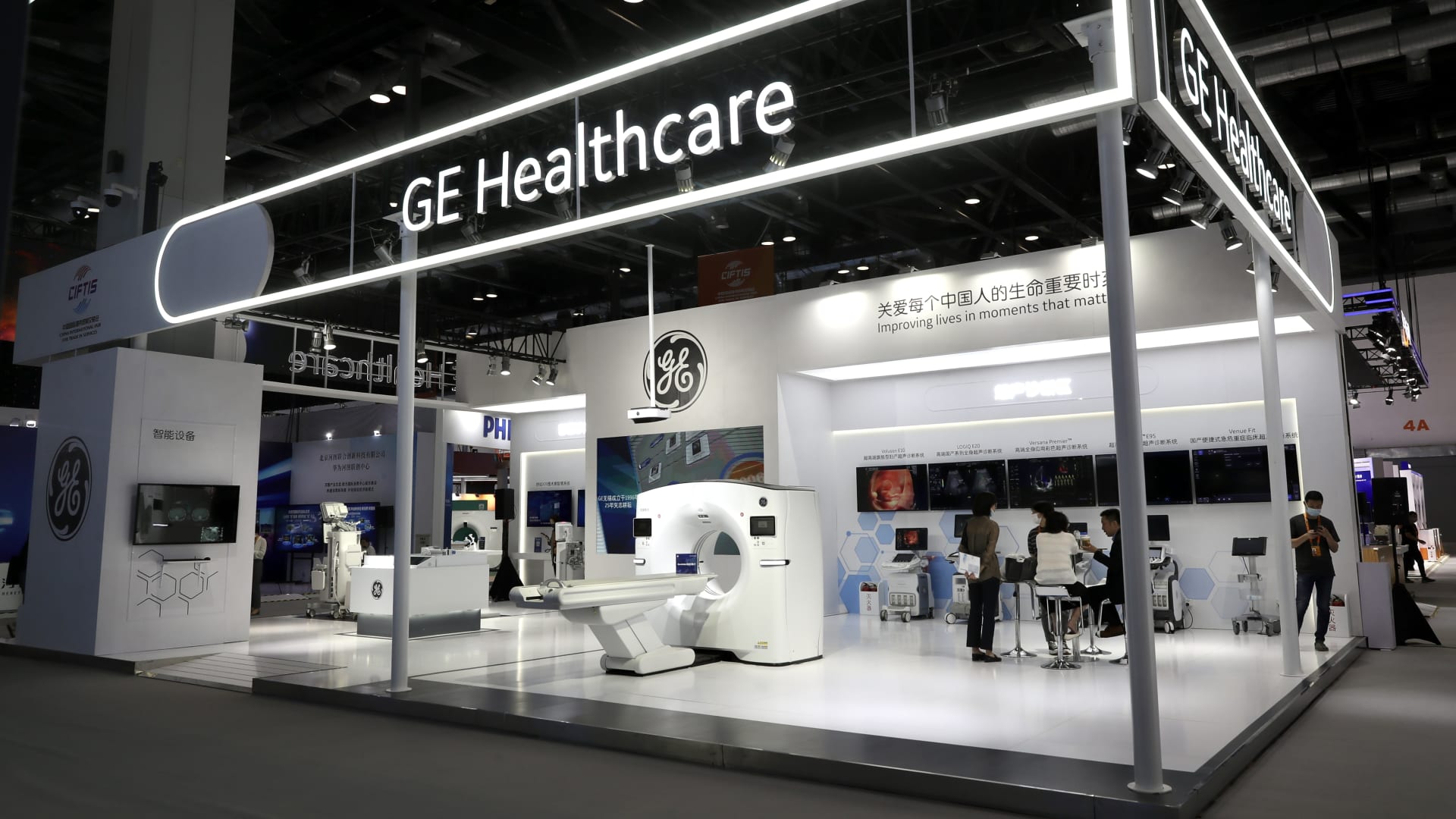GE Healthcare (GEHC) shares are sliding Thursday, giving Club members an opportunity to invest in the medical-technology company at an increasingly attractive valuation. The sellers Thursday are making a mistake, and we would capitalize on their misjudgment if not for restrictions that prevent us from trading the stock. Shares of GE Healthcare fell around 3% Thursday, to just under $78 each, as its largest shareholder General Electric (GE) takes steps to monetize its GEHC ownership stake and pay down its own debt. The noise around this transaction seems to be dragging down GE Healthcare shares. However, it does not change the company’s compelling fundamentals, including a potential boost to MRI machine demand in the coming years as emerging Alzheimer’s treatments hit the market. GE Healthcare’s largest business unit by revenue is Imaging, which includes sales of MR and PET/CT machines. “It’s killing me that we can’t buy [GEHC],” Jim Cramer said on Thursday’s “Morning Meeting,” reminding Club members we’re prevented from trading any stock he discusses on CNBC TV for 72 hours. But, as always, nothing prevents us from telling members what we’d otherwise choose to do. “If we had not mentioned it, we would be in there buying it very aggressively,” Jim said. Thursday’s declines push GE Healthcare shares below our cost basis of $79.47, which typically is a welcome development for a newer, smaller position. We initiated our 325-share stake in GE Healthcare on May 17 , with intentions to grow it over time. The stock holds a less-than-1% weighting in our portfolio Thursday. GEHC 1M mountain GE Healthcare’s stock performance over the past month. The primary reason we are looking past General Electric’s sale of 25 million GE Healthcare shares is because it involves existing stock — in other words, the transaction is not growing the number of GEHC shares and diluting existing investors in the process. This means our ownership percentage in GEHC isn’t going down, and earnings per share won’t be diminished by a larger share count. General Electric maintained nearly 20% ownership in GE Healthcare — totaling just over 90 million shares — after spinning off GEHC into a separate publicly traded company in early January. Essentially, what’s happening now is General Electric is exchanging more than a quarter of its GEHC shares in a deal with Morgan Stanley. When completed, General Electric’s debt load will be reduced by roughly $2 billion. At the end of the first quarter, General Electric had $24.5 billion in total debt outstanding. Under CEO Larry Culp for the past five years, General Electric has leaned into its core industrial business and worked to reduce its debt in the process. So, it’s hardly a surprise to see General Electric monetizing some of its GE Healthcare stake to improve its balance sheet. But it will happen again as GE looks to cash in on its stake to improve its balance sheet, and it is something investors should be aware of. In general, one reason a company may choose to divest part of its business — just as General Electric (GE) chose to do with its health-care segment, and has plans to do with its energy division — is creating flexibility to do things like reducing debt loads. GE is expected to spin off its energy portfolio, called GE Vernova, early next year. Bottom line GE Healthcare shares are getting dinged Thursday for reasons that have nothing to do with its underlying business outlook, which continues to be bright as a standalone company. Sentiment may have turned on the stock today because the $78 offer price represented a 3.08% discount to the prior closing price of GEHC, but that’s typical with secondary offerings. For example, Intel (INTC) announced a sale of its stake in Mobileeye Global (MBLY) the same night GE announced this sale. The 38.5 million share offer, which is also non-dilutive, priced at a 3.49% discount to Mobileye Global’s prior close. Both appear to be good deals based on small discounts and solid long-term prospects of both companies. What an investor needs to be more wary about is when a dilutive secondary offer is priced at a steep discount to the market. These deals are typically done by cash-burning companies who need to issue more sales to improve their balance sheets. A big discount on a dilutive deal means investors think the stock is overvalued. But the key point to know from this specific transaction is that it isn’t dilutive to shareholders. Therefore, today’s slide looks like an overreaction. If not for our trading restrictions, we would have been using Thursday’s declines to boost our ownership stake. (Jim Cramer’s Charitable Trust is long GEHC. See here for a full list of the stocks.) As a subscriber to the CNBC Investing Club with Jim Cramer, you will receive a trade alert before Jim makes a trade. Jim waits 45 minutes after sending a trade alert before buying or selling a stock in his charitable trust’s portfolio. If Jim has talked about a stock on CNBC TV, he waits 72 hours after issuing the trade alert before executing the trade. THE ABOVE INVESTING CLUB INFORMATION IS SUBJECT TO OUR TERMS AND CONDITIONS AND PRIVACY POLICY , TOGETHER WITH OUR DISCLAIMER . NO FIDUCIARY OBLIGATION OR DUTY EXISTS, OR IS CREATED, BY VIRTUE OF YOUR RECEIPT OF ANY INFORMATION PROVIDED IN CONNECTION WITH THE INVESTING CLUB. NO SPECIFIC OUTCOME OR PROFIT IS GUARANTEED.
GE Healthcare (GEHC) shares are sliding Thursday, giving Club members an opportunity to invest in the medical-technology company at an increasingly attractive valuation. The sellers Thursday are making a mistake, and we would capitalize on their misjudgment if not for restrictions that prevent us from trading the stock.
